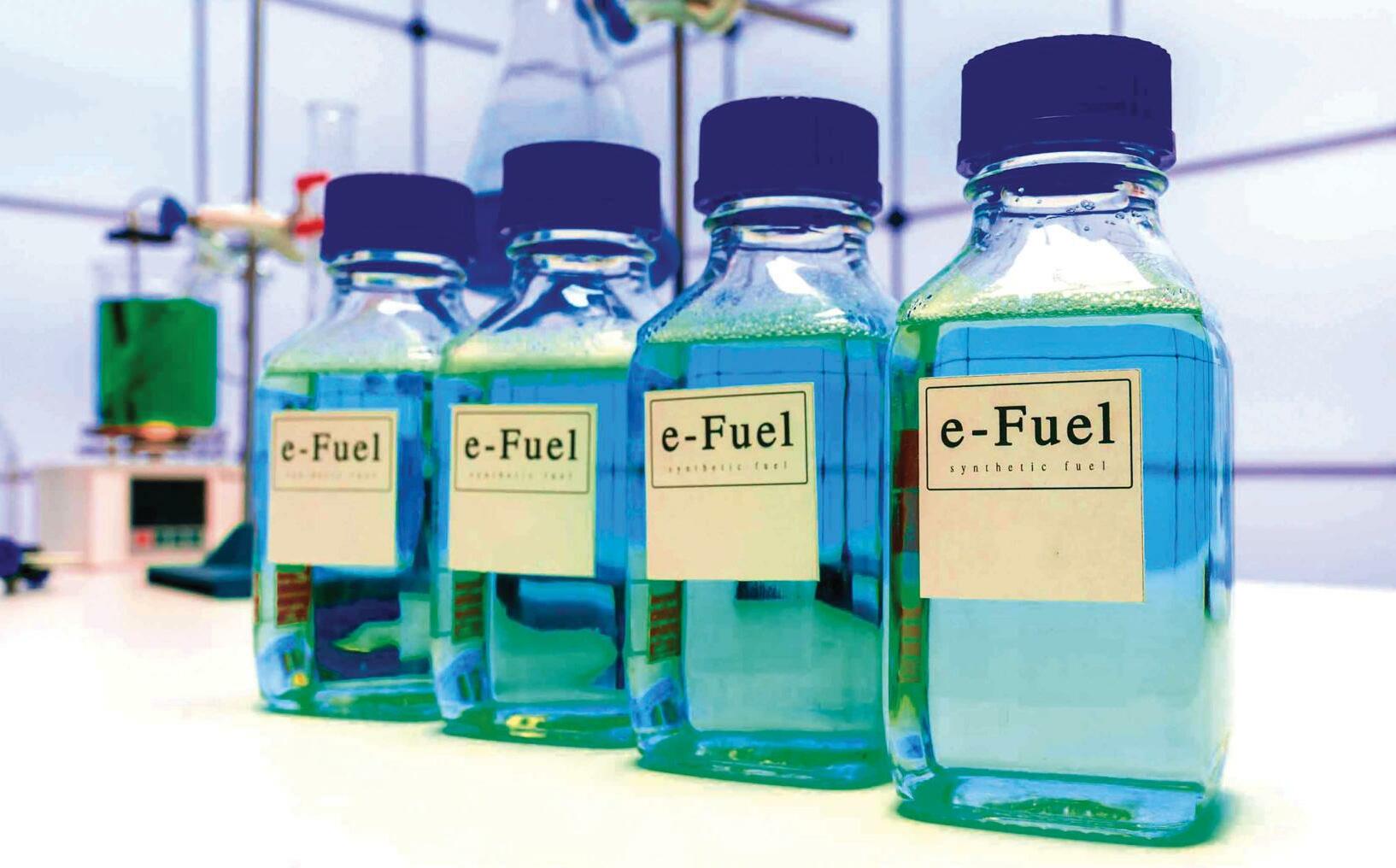
The likes of Porsche and Ferrari are banking on synthetic fuel to ensure their cars are exempt from the EU ban on the sale of new combustion engine vehicles by 2035. Synthetic fuel - or electrofuel (e-fuel) - is a form of petrol made using hydrogen from water and carbon from air. The problem is the electricity that's required to extract these elements. Nevertheless, companies are already producing e-fuel on a small scale, including some in the UK. So will we see e-fuel in petrol stations soon and can we, and the planet, afford to use it? We spoke to Prof Patricia Thornley, Director of the Energy and Bioproducts Research Institute (EBRI) at Aston University, to find out.
WHAT ARE E-FUELS?
E-fuels are synthetic fuels. We create them from the building blocks of carbon dioxide (CO₂) and hydrogen. You can use electrolysis to produce hydrogen and you can pull the CO₂ out of the atmosphere by direct air capture. Combining these produces a hydrocarbon fuel. If you get different mixes of these molecules, then that provides you with different fuels for different purposes: lighter molecules are suitable for, say, an aircraft's ignition fuel, while you'll need heavier molecules for car or marine engines.
HOW ARE THEY DIFFERENT FROM BIOFUEL?
With biofuels (for example, ethanol and biodiesel) you're growing material that contains carbon, hydrogen and oxygen, and trying to convert it into a liquid or gas that you can use. In many ways, that pathway is the same with e-fuels but it's different in that biofuel needs land.
The main advantage of e-fuel is that you're not using plants but the disadvantage is that you're using more energy and this energy still has to come from somewhere.
HOW DOES E-FUEL HELP TO CUT DOWN CARBON EMISSIONS?
This story is from the June 2023 edition of BBC Science Focus.
Start your 7-day Magzter GOLD free trial to access thousands of curated premium stories, and 9,000+ magazines and newspapers.
Already a subscriber ? Sign In
This story is from the June 2023 edition of BBC Science Focus.
Start your 7-day Magzter GOLD free trial to access thousands of curated premium stories, and 9,000+ magazines and newspapers.
Already a subscriber? Sign In

COULD MARINE CLOUD BRIGHTENING HELP US FIGHT CLIMATE CHANGE?
The theory behind marine cloud brightening is that brighter or whiter clouds reflect more sunlight back into space.

IS IT SAFE TO RUN EVERY DAY, OR SHOULD I DITCH MY RUN STREAK TO SAVE MY KNEES?
A running streak, where you run every day without taking rest days, can be highly motivating and beneficial for overall fitness. Running is great cardiovascular exercise and isn't to be discouraged (and finding a routine with some consistency is great). Getting a bit of exercise as often as possible is also hugely beneficial for your mental health.

WHAT MAKES THE MEDITERRANEAN DIET SO GOOD FOR US?
The Mediterranean diet may help you live longer, especially if you also adopt the lifestyle of people living near the Med during the 1950s.

WHAT IS MEXICO'S BLUE HOLE?
The world's deepest blue hole (marine sinkhole) lies off the coast of Mexico's Yucatán Peninsula. It's at least 420m (1,378ft) deep, but explorers still haven't found its bottom.

HOW CAN I TELL IF I'VE GOT HIGH CORTISOL LEVELS?
Cortisol is a hormone produced by glands in our bodies called the adrenal glands, which sit above the kidneys. It plays a critical role in various bodily functions, including regulating metabolism, reducing inflammation and helping the body respond to stress. While essential for our health, chronic elevation of cortisol levels can lead to several issues.

THE LUNGFISH
In 1836, European scientists discovered a peculiar animal from the River Amazon that they struggled to identify. Its eel-like body was a few feet long and its air-filled lungs persuaded anatomists it must be a reptile.

ARE WE THE ONLY SPECIES TO HAVE BEEN THROUGH A STONE AGE?
The Stone Age might conjure up images of early humans, sitting around a campfire or hunting prehistoric beasts, but evidence shows that we're not the only species that has learned how to work with stone tools. Wild chimpanzees (Pan troglodytes) use stone tools to crack open nuts.

Should we scrap daylight saving time?
Most of us look forward to the extra hour we get in bed every October, but researchers argue that changing the clocks twice a year harms our health

THE INTERNET OF ANIMALS
SCIENTISTS ARE USING ELECTRONIC TAGS AND SATELLITES TO TRACK WILD ANIMALS AND CREATE A DATA NETWORK THAT COULD HELP US ADDRESS THE BIODIVERSITY CRISIS

MUSIC FOR A DISTRACTED GENERATION
The number of things competing for our attention is often overwhelming. Can dreamy soundscapes created with neuroscience help our bewildered brains to concentrate?